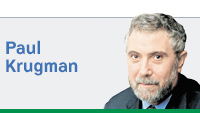Subscriber Benefit
As a subscriber you can listen to articles at work, in the car, or while you work out. Subscribe Now
People keep saying that Donald Trump is a populist. I do not think that word means what they think it means.
OK, it’s true that our so-called president—hey, if he can say that about a judge who ruled against him, surely we can say that about him—is channeling the racism and bigotry of some ordinary Americans, and in so doing sticking it to squeamish elites that take the Constitution both seriously and literally. But so far his economic policies are all about empowering ethically challenged businesses to cheat and exploit the little guy.
In particular, he and his allies in Congress are making it a priority to unravel financial reform—and specifically the parts of financial reform that protect consumers against predators.
Trump recently released a memorandum calling on the Department of Labor to reconsider its new “fiduciary rule,” which requires financial advisers to act in their clients’ best interests—as opposed to, say, steering them into investments on which the advisers get big commissions. He also issued an executive order designed to weaken the Dodd-Frank financial reform, enacted in 2010 in the aftermath of the financial crisis.
Both moves are very much in line with the priorities of congressional Republicans and, of course, the financial industry. For both groups really, really hate financial regulation, especially when it helps protect families against sharp practice.
Why, after all, was the fiduciary rule created? The main issue here is retirement savings—the 401(k)s and other plans that are Americans’ main source of retirement income over and above Social Security. To invest these funds, people have turned to financial professionals—but most probably weren’t aware that these professionals were under no legal obligation to give advice that maximized clients’ returns rather than their own incomes.
This is a big deal. A 2015 Obama administration study concluded that “conflicted investment advice” has been reducing the return on retirement savings by around one percentage point, costing ordinary Americans around $17 billion each year.
On Dodd-Frank, Republicans would like to repeal the whole law, but probably don’t have the votes. What they can do is try to cripple enforcement, especially by undermining the Consumer Financial Protection Bureau.
The goal of the bureau is to protect ordinary families from financial scams—and by all accounts it has been a huge success, increasing transparency, reducing fees, and exposing fraud.
So why are consumer protections in the Trump firing line?
Gary Cohn, the Goldman Sachs banker appointed to head Trump’s National Economic Council—populism!—says that the fiduciary rule is like “putting only healthy food on the menu” and denying people the right to eat unhealthy food if they want it. Of course, it doesn’t do anything like that. If you want a better analogy, it’s like preventing restaurants from claiming that their 1,400-calorie portions are health food.
Trump offers a different explanation for his hostility to financial reform: It’s hurting credit availability. “I have so many people, friends of mine that had nice businesses, they can’t borrow money.”
Other would-be borrowers, however, don’t seem to be having problems. Only4 percent of the small firms surveyed by the National Federation of Independent Business report themselves unsatisfied with loan availability, a historic low.
So what’s motivating the attack on financial regulation? Well, there’s a lot of money at stake—money that the financial industry has been extracting from unwitting, unprotected consumers. Financial reform was starting to roll back these abuses, but we clearly now have a political leadership determined to roll back the rollback. Make financial predation great again!•
__________
Krugman is a New York Times columnist. Send comments to [email protected].
Please enable JavaScript to view this content.
